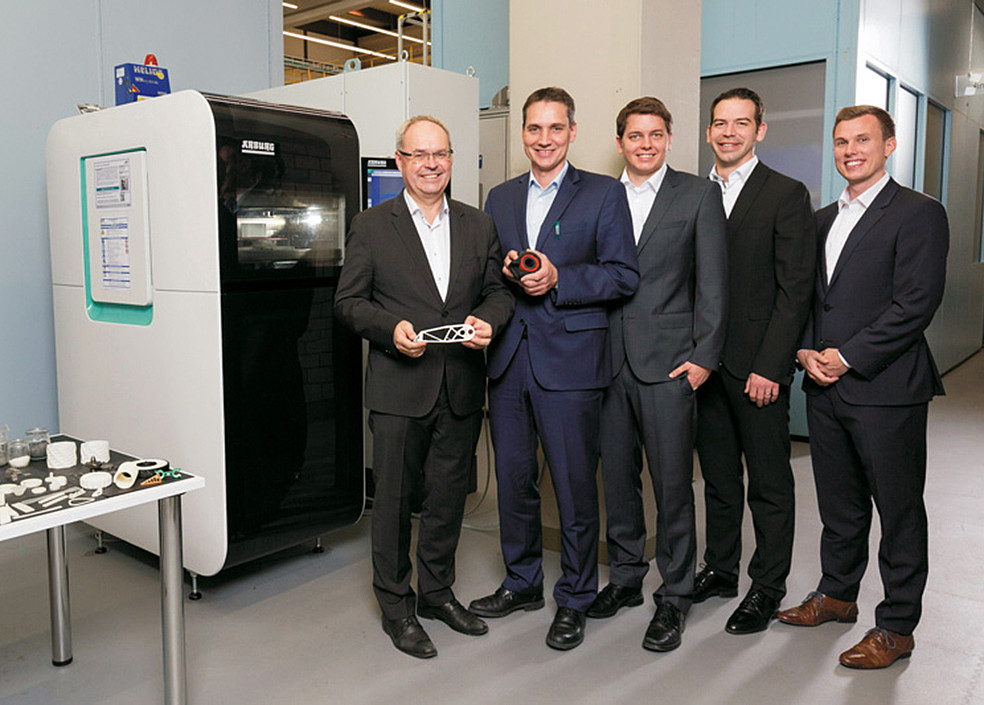Published on April 30, 2021
Six Good Reasons for Research Cooperation with KIT

The rapid pace of technical progress and shorter product cycles are increasing the pressure on product development in the free economy. For this reason, many companies rely on external expertise and the use of temporary infrastructure in the area of research and development. Innovation-driven companies do not create product innovations exclusively on their own, but build on product-oriented cooperation. Our six reasons explain why research institutions and universities can be suitable innovation partners for companies:
1. Close R&D gap
Particularly small and medium-sized companies that do not have their own research and development (R&D) department can benefit from cooperation with colleges, universities or research institutions. They can use the innovation resources from the institutions without expanding their own cost-intensive R&D department. By acquiring rights of use or licenses to the valuable research results, companies and start-ups have the opportunity to gain a knowledge and development edge over the competition. The development costs are only incurred temporarily during the ongoing cooperation and thus remain at a lower level overall than the expansion of an in-house R&D department. However, competitiveness can still be ensured in this way.
2. Open up new technology areas and recruit young talents
Are you facing the challenge of establishing a new competence area in your company? Then a cooperation with a research institute is a good way to approach a topic area. Based on master's, diploma or doctoral theses, you can specifically advertise your topic and gain important, initial findings on the technology. The temporary use of external expertise gives you the opportunity to evaluate the potential of new technologies and to make well-founded decisions about building up in-house expertise. Initial good cooperation experiences can develop into a strategic partnership in the long term. If the cooperation is successful, you will often be able to recruit graduates as new employees and establish the new area of expertise within the company.

3. Use external high-tech infrastructure
Work in research and development is characterized by recurring validations of product innovations and test series, for example on new materials or product variants. However, the necessary equipment for testing and inspection purposes is not used on a daily basis, so that the investment-intensive purchase is not always worthwhile for companies. In this case, the instrumental equipment provided by research institutes is a practical solution that you can use frequently at lower cost instead of purchasing it yourself at great expense. Many institutes provide their equipment and test facilities to industrial companies as part of contract research and research services. Take advantage of this offer and the associated experience of the researchers.
4. Receive impulses through new perspectives
In the course of their scientific careers, researchers acquire a very broad overview knowledge as well as specialized expert knowledge in their field. As an industry partner, you can benefit from this comprehensive know-how. The view from the outside on your company-internal questions constitutes a high-quality, objective advice. In addition, you receive access to the academic community and other experts in the research field through the personal exchange and the network of the scientific cooperation partner.
5. Tax advantages for R&D projects
On January 1, 2020, a tax-based research allowance was introduced in the context of the Research Allowance Act(FZulG). Since then, companies that commission scientific institutions in bilateral projects have been reimbursed up to 25 percent of the order volume by the federal government. The allowance can be claimed regardless of the company's profit situation - a monetary incentive that could increase your company's readiness to cooperate. The following three categories are generally eligible for funding:
- basic research
- industrial research or
- experimental development.
R&D projects started after Dec. 31, 2019, are eligible for funding. This means that you can also apply retroactively for reimbursement for research cooperation in 2020. For more details on the funding, see the FAQ on the research allowance from the German Federal Ministry of Finance.
6. Help to shape research trends
The advantages of research cooperation are not only on the side of industry. Rather, synergies arise for both sides from joint collaborations. Companies provide valuable ideas and clues for new inventions and open questions in the technological field. As an industrial partner, you thus indirectly support the practice-oriented further development of research focuses and priorities in science.
Start cooperation with KIT?
Could we convince you that research cooperation can be an added value for the entrepreneurial development? Would you like to open up a cooperation partner at KIT? In this case, the team of Innovation and Relations Management at KIT will be pleased to support you in identifying suitable knowledge carriers at KIT and in finding a suitable form of cooperation.
In the KIT Technology Platform, you can find concrete technology offers for which KIT is already specifically looking for cooperation partners. In addition, there are possible starting points for cooperationin all KIT institutes. For companies which want to cooperate with KIT for the first time or develop complementary, new forms of cooperation, there are various offers and instruments. We will be pleased to help you! Or read up on the most important questions about technology commercialization at KIT with our FAQs.


comments about this article
No comments